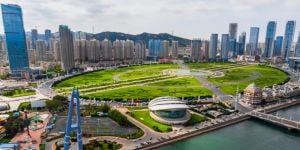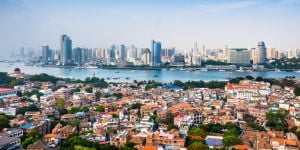What can I small family do with 5000rmb?
Subscribe to the topic
Post new topic
Hi guys, I am moving to Suzhou in August with my wife and my 5 year old son. I will be paid 5000 rmb monthly. Housing and medical insurance are paid by the school and I will get 400 rmb monthly as utilities stipend. I would like to know if we could live on 5000 a month (food and transportation) or if we need more than that. Thank you for your kind replies.
You can get by on 5,000 RMB's per month for, but a lot will depend on your lifestyle choices.
How much you spend on transportation depends on where you live in relation to where you work, and how far you have to travel to purchase living essentials like food and clothing. Buses are cheap, only a few RMB's per ride. Bikes are one-time expenses (hopefully), and you can outfit them cheaply with a rack in back and a front basket to help haul home your bounty.
Half your budget, 2,500 per month (~83 RMB's/day), is more than enough to feed three people if you cook and eat most of your meals at home. You'll also be able to fit in a few restaurants meals each week.
Clothing is somewhat discretionary, but you can get by with a modest clothing allowance buying clothing as the locals do.
You didn't mention anything about your child's schooling, but of course that could be a major expense depending on what's available through your job offer and what your plans are for your child's education.
You weren't clear about it, but it seems you're being hired as a teacher. If so, ask the school to provide you with contact information for current and past foreigners who taught there. You can ask those teachers for information about how they handled these things. You can also go to a site like Dave's ESL Cafe (daveseslcafe.com) and ask other teachers for help on adjusting to living in Suzhou.
You may not be totally satisfied with your shelter and health care services, but it seems those expenses are covered. Everything is a matter of making lifestyle choices and adjusting to a new way of life in a different country than you're used to now.
Also, check out the information under this Suzhou Forum posting: Can I live on USD$2000 a month in Suzhou?
Eli, Thank you very much for your reply.
This is the truth. I was hired by an international school. They will pay my salary in dollars in an account in another country which may be the US. Additionally they will pay an Overseas Cost of Living stipend of 5000 rmb. They provide housing, and transportation from home to school and back. Additionally, my son gets to study in the school for free. I would pay for trips and uniforms. My intention is to save as much as it is possible since I have financial responsibilities back home. I am curious about how much I could do with that stipend monthly. We are really good at taking care of our meals at home, which does not mean we do not eat out.
I love the idea of getting a bike. Especially for the work out. I am kind of concerned about getting myself understood by a cab driver but I think it is quite worth it to give it a try.
I would like to know what opinion you have about:
Communicating with locals. How helpful is English? How urgent and to what extent do we need to learn mandarin? I am already scrapping some lessons and already getting scared at how difficult it is.
What is the cost of Utilities? Can we get cellphone with data plans at an affordable price and with good service?
Are there any safety concerns that expats need to be aware of?
thank you
If you have payment of your housing, kid's schooling, and transportation expenses already arranged for, then you might be able to save 40% to 50% of your monthly salary. There's too many factors involved to give you a number with any certainty.
Basic cable (only one English channel, CNN) + high-speed Internet access will cost about 55 RMB's per month.
Electricity, gas, and water will cost another 150-250 RMB's per month, depending on your usage.
It's doubtful you'd have to pay association dues or maintenance fees for your apartment complex, but check to see if there are add-on fees. Ususally that's all included in the monthly rental charge.
Roughly estimate your Chinese cell phone will cost you about the same as it does in the States. There are a hundreds of phones to choose from, and the service monthly plans are similar to those offered in the West. There are only a few service providers. You can also opt for a pay-as-you-go plan. You'll probably need a local to help you sort all this out--someone that can communicate in English and Chinese. You'll find a neighbor or someone at the school that can help you.
Knowing English is not a necessity. There are plenty of people in China that understand some basic level of English in most places to help you. Most children are taught English in schools, and all university students must pass an English equivalency examination before graduation. You can almost always find a younger person to help you if you really need it. You can also get by in almost every situation with gestures. Shopping is easy because prices are listed in Arabic-Hindu (Western) numerals. You already know how to show 1 to 5 on one hand, and the hand signals on one hand for 6 to 10 are learned in 5 minutes. And there's always a calculator around in small shops and restaurants to negotiate and communicate prices. Converting from RMB's to USD's and U.S. measurements into metric are easy enough to do with a little practice. You'll get the hang of it quickly. Those awkward seconds of misunderstood communications are quickly resolved one way or another. Many signs are written in English or Pinyin, and lots of menus have photos. It won't take you too long to figure out what's inside a shop or building or store based on simple observations. So don't worry about not knowing Chinese language when you arrive.
Some travel tips. You can usually get the address of a destination written in Chinese from the Internet. You can also use an Internet translator to convert your ideas to Chinese characters. If you don't have a printer, then you can write out the Chinese characters with the address information to show a taxi driver. Once you get to your destination look for a business card, brochure, or other materials with the name and address of your location for the next time you have to go there. Or go to a nearby hotel or business and get one of its business cards. You can also get someone to help you write out your home address, and then keep two copies with you at all times in different places. So if your wallet, purse, or backpack is lost you have a backup plan to get back home.
Theft is a problem in China, but you won't have to worry about being confronted on the streets. Theives act quickly by swiping a bag, laptop, or bike when no one is looking. Almost every corner or alleyway in China is safe for Westerners to walk about freely, day or night--assuming you're not doing something incredibly mindless that begs for you to be robbed. You can find a number of websites that give general advice about avoiding pickpockets and scams. But the threat of physical violence against you is extremely low.
On the other hand, safety and traffic are never mentioned in the same paragraph here. Forget everything you know about obeying traffic signs, road rules, speed limits, etc. No one else is paying attention to them. It's a free-for-all out there, so keep your eyes and ears open, and your head on a 360-degree swivel. A particular danger in Suzhou are the electric bikes and scooters that blow past you within inches at 35 kms/hr, often without a warning sound. And expect cars and bikes to drive in the dark with no lights on. No street, alley, or sidewalk is truly safe, so keep your wits about you at all times. No need to be scared. Just be aware of the dangers, and learn how to avoid them.
Food and water safety issues exist in a general sense, but they're nothing you can't adjust to quickly by following the common sense advice of others.
I hope this helps.
Another thing to consider are your "start-up" costs--the expenses you'll incur outfitting your new home. For example, you'll have to probably buy new linens, kitchenware, small appliances, house-cleaning products, toiletries, etc. You may also have to buy some new furnishings, even if your new home is "furnished". Such as a new bed mattress or furniture appropriate for your child. If you're running a tight budget expect to spend $500 to $1,000 (3,150 to 6,300 RMB's) on these items. You can easily spend more if your tastes run high. These kinds of expenses will subside significantly after your first month or so in your new home.
Following up on some previous remarks, here's a helpful article on getting a cell phone in China:
http://www.echinacities.com/expat-corne … china.html
5000RMB including rental and energy cost(gas/water/electricity)and foods and transportation would be a little difficult to cover i think. also depends where u live. If u live in SIP,Suzhou. at least 3,500RMB for a small apartment for ur family.
Articles to help you in your expat project in Suzhou
 Accommodation in Suzhou
Accommodation in SuzhouLocated in China's Jiangsu province, Suzhou is home to over six million people. The city is often called the ...
 Finding work in Suzhou
Finding work in SuzhouLocated in Jiangsu province, Suzhou is an important Chinese city. It is just about 100 kilometers away from ...
 Accommodation in Dalian
Accommodation in DalianDalian is the biggest city in Liaoning province. The city is home to over six million people, many of which are ...
 Accommodation in Chongqing
Accommodation in ChongqingChongqing is an important city in southwest China. It is home to over 30 million people and is considered to be ...
 Accommodation in Tianjin
Accommodation in TianjinTianjin is a first-tier coastal city in northern China and a busy and crowded metropolis with over 15 million ...
 Accommodation in Xiamen
Accommodation in XiamenXiamen, located in Fujian Province in China, is one of southern China's most picturesque coastal cities and ...
 Buying property in Shanghai
Buying property in ShanghaiShanghai has continually appeared close to the top of the list of cities with the most expensive real estate in ...
 Finding work in Shanghai
Finding work in ShanghaiShanghai frequently tops the list of the most desirable destinations for expats in China — in no small part ...
Find more topics on the Suzhou forum



